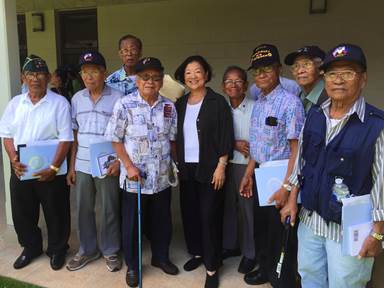Bill Seeks to Expedite Visas for Kids of Filipino WWII Veterans
Senators Mazie K. Hirono and Brian Schatz, and Representatives Colleen Hanabusa and Tulsi Gabbard introduced the Filipino Veterans Family Reunification Act today, a bicameral bill that would expedite the visa process for children of Filipino World War II veterans.

Senator Hirono with Filipino World War II veterans. File courtesy photo.
“When called to serve, Filipino World War II veterans fought and sacrificed alongside American servicemen,” said Senator Hirono. “However, as a result of our country’s antiquated immigration system, these brave soldiers have been waiting more than a half century to be reunited with their loved ones. While the Filipino World War II Veterans Parole program provides temporarily relief for Filipino World War II veterans and their children, this bill codifies our nation’s promise to reunite these families.”
“Filipino World War II veterans deserve to be reunited with their families in the country they served,” said Rep. Hanabusa. “It’s time for Congress to put families before bureaucracy. Congress must remove the artificial barriers to immigrant visas contained in the current law and bring the families of our veterans together now.”
“Filipino World War II veterans in Hawaiʻi and across the country have been waiting to be reunited with their families for decades,” said Senator Schatz. “For these aging veterans who are now in their 90s, time is running out. It’s time to finally do the right thing, honor our promise to these veterans, and reunite them with their loved ones.”
“More than 200,000 Filipino and Filipino-American soldiers served our country during World War II, suffering, fighting, and giving their lives for the freedoms and liberties we hold most dear,” said Representative Gabbard. “Today, these brave veterans are in their late 80s and older, with many having waited decades to be reunited with their family members who are stuck in the immigration pipeline. They cannot afford to wait any longer. This legislation recognizes and honors the service of our Filipino WWII Veterans by expediting the visa process for their children and allowing them to finally be together as a family in the nation our veterans served.”
In 1990, the United States granted Filipino veterans citizenship in recognition of their service to the United States during World War II. Their children, however, were not granted citizenship. Currently, veterans must file for a family visa to be reunited with their children in the United States. Because of an antiquated immigration system with limited numbers of family visas available each year, it can take more than 20 years for these applications to be reviewed. The Filipino Veterans Family Reunification Act exempts the veterans’ children, approximately 20,000 individuals, from the numerical limitation on immigrant visas.
“We sincerely thank Senator Mazie Hirono for reintroducing legislation that would allow Filipino World War II veterans to be reunited with their family members after many long-awaited years. Filipino World War II veterans served our nation with courage, dignity and strength, and we must continue to recognize and honor that sacrifice,” said Chris Kang, National Director of the National Council of Asian Pacific Americans.
“It is critical that we continue to honor the service and sacrifice of our Filipino World War II veterans,” said Brendan Flores, National Chairman of the National Federation of Filipino American Associations. “We thank Senator Hirono for her leadership reintroducing the Filipino Veterans Family Reunification Act, and look forward to working with other Members of Congress to pass this important legislation. Time is running out, and we must do everything we can to expedite the process of our veterans reuniting with their children.”
“Filipino World War II veterans have served this country with distinction and waited far too long – decades in most cases – to be reunited with their family members,” said John C. Yang, president and executive director of Asian Americans Advancing Justice | AAJC. “We applaud and support this effort to remove any further barriers that keep the families separated from these military heroes.”
In 2016, after years of advocacy by Senator Hirono, U.S. Citizenship and Immigration Services began implementation of the Filipino World War II Veterans Parole program to reunite veterans and their surviving spouses with adult children and certain other relatives. However, the program is limited and provides no guarantee that these veterans will be reunited with their loved ones. The Filipino Veterans Family Reunification Act provides a permanent solution, amending the Immigration and Nationality Act to exempt from global limits the sons and daughters of Filipino World War II veterans who were naturalized under the 1990 law or other specified laws.
Senator Hirono has made fighting for Filipino veterans a top priority during her time in Congress, as the need to reunite these aging veterans with their loved ones grows more urgent every year. Currently, there are fewer than 6,000 Filipino World War II veterans residing in the United States who would be able to take advantage of the benefits bestowed by the Filipino Veterans Family Reunification Act to be reunited with their loved ones.
In 2013, Senator Hirono and Representative Hanabusa reintroduced the Filipino Veterans Family Reunification Act, which was later included as an amendment in the bipartisan comprehensive immigration bill that passed the Senate (S. 744). However, the House failed to consider the bill. In 2016, Senator Hirono led the successful effort to enact the Filipino Veterans of World War II Congressional Gold Medal Act, which awards Filipino World War II veterans with the Congressional Gold Medal in recognition of their dedicated service to the United States.
Cosponsors of the Filipino Veterans Family Reunification Act include: Senators Dianne Feinstein (D-Calif.), Tim Kaine (D-Va.), Catherine Cortez Masto (D-Nev.), Lisa Murkowski (R-Alaska), and Brian Schatz (D-Hawaii), and Representatives Madeleine Bordallo (D-Guam), Judy Chu (D-Calif.), Tulsi Gabbard (D-Hawaii), Al Green (D-Texas), Gene Green (D-Texas), Raul Grijalva (D-Ariz.), Luis Gutierrez (D-Ill.), Barbara Lee (D-Calif.), Ted Lieu (D-Calif.), Grace Napolitano (D-Calif.), Scott Peters (D-Calif.), Adam Schiff (D-Calif.), Bobby Scott (D-Va.), Darren Soto (D-Fla.), Eric Swalwell (D-Calif.), Mark Takano (D-Calif.), and Juan Vargas (D-Calif.).










